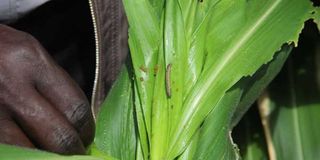Flour crisis to persist as CS says maize harvest to drop 25 pc

A fall armyworm on a maize crop on a farm in Eldoret. Agriculture Cabinet Secretary Willy Bett has announced the maize yield is expected to drop by 25 per cent this year over drought and armyworm invasion. PHOTO | JARED NYATAYA | NATION MEDIA GROUP
What you need to know:
- He asked farmers to change their pest control regime so as to contain the spread of the worm.
- He said the government has currently imported enough maize to feed Kenyans.
Agriculture Cabinet Secretary Willy Bett has warned that the country’s annual maize yield could drop by 20-25 per cent this year due to the invasion and the continuing spread of the fall armyworm.
Mr Bett said the government was worried about Kenya’s future food security as the pest continues to invade more maize farms in new regions across the country.
He said the invasive pest, which was previously reported only in western Kenya, has since crossed over to Kwale in the coastal region, among other areas, further complicating an already worsening food security situation.
“Our research has found that this pest attacks farms at night because it is nocturnal. In that case, we call on farmers to spray their farms in the evening, [when] the pest comes out to attack crops,” Bett said.
PEST
The CS was speaking on Wednesday at the Kenya Agriculture and Livestock Research Organisation (KALRO) in Nairobi where he received a donation of farm chemicals worth Sh10 million from Bayer East Africa to combat the pest.
He asked farmers to change their pest-control regime so as to contain the spread of the worm while also calling on chemical manufacturers to consider huge discounts for small-scale farmers and step up awareness campaigns.
Mr Bett added that the Ministry of Agriculture had approved at least nine chemicals for controlling the pest, including Belt.
“Researchers are exploring biological means of controlling the pest, but currently chemical control is the way to go.
"But I have challenged KALRO and other institutions to study what other countries are doing other than the use of chemicals to fight this worm and we are open to those alternative methods,” said the CS.
DROUGHT
He added: “Our harvests will start coming in from October or November going forward but now we are importing maize because of drought coupled with the fall armyworm invasion.”
He said the government has currently imported enough maize to feed Kenyans but more will be needed in the near future to fill the gap as the government had no clear projections on the extent of the effects of the drought and the pest.
For his part, Bayer East Africa Managing Director Eric Bureau noted that the pest was not only threatening famers’ food security but also their income
“Since the outbreak of this pest in Kenya we have monitored the situation closely by putting agronomists on the ground. Belt (chemical) has successfully been used by farmers in Brazil, South Africa and Zimbabwe,” said Mr Bureau.
The worm, according to the Food and Agriculture Organisation (FAO), is native to the Americas but no one knows how it exactly crossed the seas to Africa.






